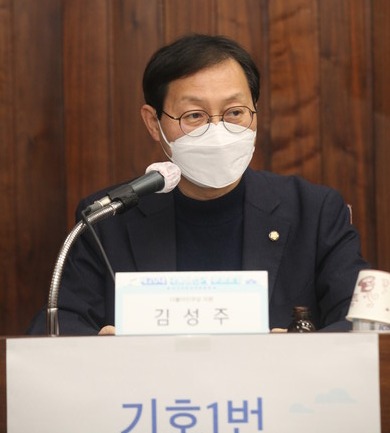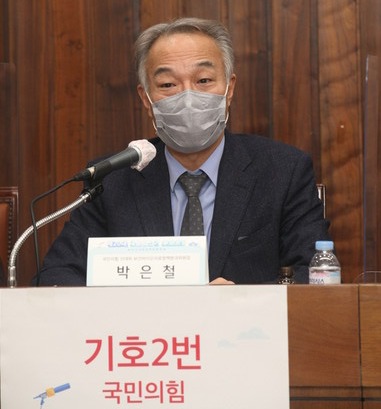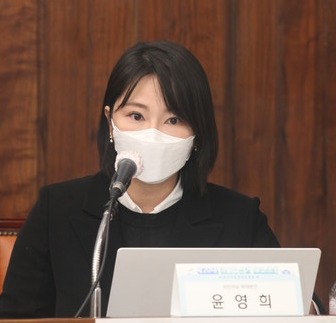What are major presidential candidates' health and medical policies? – Korea Biomedical Review

Just 16 days are left before the election to pick the 20th president of the Republic of Korea. Therefore, the council of professional journalists covering the Ministry of Health and Welfare held a debate on major candidates’ health-welfare policies by inviting four major parties – the Democratic Party of Korea (DPK), the People Power Party (PPP), the Justice Party (JP), and the People’s Party (PP) – and listened to their policy platforms.
The debaters who participated in the debate on behalf of candidates expressed positions of their parties and standard-bearers on a variety of issues, such as expanding public medicine and medical workforce, increasing health insurance’s coverage scope, preparing for the post-Covid-19 era, health and medical policies in the future, developing biopharmaceutical industry, and supporting vaccine and other pharmaceutical manufacturing. — Editor
From left, Rep. Kim Seong-ju of DPK, Park Eun-cheol of PPP’s campaign headquarters, Koh Byung-soo of JP’s campaign headquarters, and Yoon Young-hee, deputy spokesperson of PP
Agree on need to increase doctors, differ in establishing more medical schools
The four major candidates agreed on the need to expand public health services and increase the number of doctors. However, they differed in methods.
Rep. Kim Seong-ju of DPK, who attended on behalf of candidate Lee Jae-myung said Lee would push ahead with the policies pursued by DPK, including the establishment of national health and medical graduate school. Particularly, he mentioned the need to set up medical schools in regions without them, citing South Jeolla Province as an example.

Rep. Kim Seong-ju of the governing Democratic Party of Korea
“DPK and candidate Lee Jae-myung think Korea has an insufficient medical workforce, especially manpower in essential medical areas,” Kim said. “We have maintained a position that the government should provide various supports to secure workforce in essential public health areas, and, if necessary, the government should come forward to foster manpower directly.”
Rep. Kim recalled that the government and the ruling party announced plans to establish a national graduate school of health and medical science, a graduate school in the concept of a professional medical academy, last August.
“Currently, South Jeolla Province has no medical schools, and we think the government should allow the establishment of a new medical school in such a region. As to the remaining demand for doctors, we will increase the workforce through discussions with existing medical colleges.”
The main opposition PPP also agreed on the need to replenish the medical workforce. However, the conservative party called for expanding the currently small medical colleges instead of establishing additional medical schools.
“There are 40 medical schools in Korea and 120 in the United States. However, the U.S. has population six times larger than Korea’s. That means we have twice as many medical colleges as America against the population,” said Park Eun-cheol, head of the health and welfare team at candidate Yoon Suk-yeol’s campaign headquarters. “Instead of establishing new medical schools, we need to consider first expanding the entrance quota of 17 schools with fewer than 50 enrollment quotas.”
The progressive JP also opposed the establishment of new medical schools.
“JP and candidate Shim Sang-jeong agreed on the need to expand public health service and medical workforce. However, what’s important is how to bring what has been privatized into the public domain,” said Koh Byung-soo, head of his party’s health policy committee. “While the central and local governments actively support the private sector, they should enhance the public medical service by, for instance, introducing family doctor system, reinvigorating the primary care, and upgrading comprehensive community care system.”
Koh also agreed to the increase of doctors in essential medical areas but opposed the establishment of a new medical school in Mokpo, South Jeolla Province.
“Mokpo may have no medical colleges, but South Jeolla Province has one. Therefore, we need to increase the entrance quota of the existing schools and induce them to provide essential medical services,” he added.
Minor opposition PP called for promoting a research-oriented medical college.
“Candidate Ahn Cheol-soo has a position that Korea needs to have a medical school based on engineering and specializing in research to strengthen the competitiveness of the biotech industry and secure vaccine sovereignty,” said Yoon Hee-young, deputy spokesperson of PP. “This is also linked to the entrance quota of medical schools, requiring a social debate in advance to decide its enrollment quota, establishing method, and the government’s support to it.”
How to expand health insurance coverage?
Concerning the expansion of health insurance coverage, the journalists asked the participants to evaluate the “Moon Jae-in Care” and present their future policy directions.

Park Eun-cheol, head of health, bio, and medical policy team at PPP’s campaign headquarters
“We don’t want to change the policy direction toward expanding health insurance coverage, but would like to change its concept,” Park said. “If we use the ‘three-layered protective shield’ of readjusting coverage priorities, making the most of disaster medical expenses, and covering individuals’ burdens due to unpaid services, we can provide far greater coverage while saving insurance funds.”
Koh of JP criticized the Moon Jae-in administration for only squeezing doctors to convert unpaid services into paid ones, triggering resistance from field doctors and confusing the public.
“JP will put a cap on medical expenses and strengthen primary care to expand insurance coverage so that all people can manage their health comfortably and reduce medical expenses,” Koh said. “We will slowing upgrade coverage under the grand picture of strengthening the medical delivery system and primary care.”
Yoon of PP also accused the Moon administration of failing to keep his promise to raise the health insurance coverage rate by 70 percent as of 2019, increasing people’s actual insurance burdens.
“PP is focusing on two points – maintaining the sustainability of health insurance and resolving disastrous medical expenses,” Yoon said. “We propose a dual system of health insurance, in which the government may reduce the coverage of minor ailments, such as cold, but take greater responsibility for rare and severe diseases, including cancer.”
Rep. Kim of DPK also acknowledged the government’s failure in controlling the public’s burdens from indemnity insurance and uncovered services. For example, while the government managed to control unpaid services in large general hospitals, he said it failed to curb unpaid services at neighborhood clinics.
“If we retake the power, the next government will simultaneously control health insurance fees, indemnity insurance fees, and uncovered services,” Kim said.
Covid-19 fight in past two years and post-pandemic tasks
All three opposition parties made low evaluations of the government’s quarantine performances against Covid-19 over the past two years.

Koh Byung-soo, chairman of KP’s Health Policy Committee
“I will give 90 points to the government’s quarantine performances against Covid-19 in the early phase, but only 50 points as current grades,” Koh of JP said. “As the pandemic prolongs into the third year, the government should change quarantine measures, but it still resorts to containment as in the initial phase.”
Noting that the government is about to loosen restrictions only now, Koh said it should have done so far earlier, considering the economy.
Yoon of the PP emphasized that quarantine policy should be based on science, but the government has paid too much attention to public opinion.
“I can seldom give good marks to such a policy,” Yoon said. “From now on, the government shifts its policy based on experts’ opinions.”
Rep. Kim of DPK said that even a war waged well could cause fatigue to participants and watchers. Now that the government has been waging anti-coronavirus combat for more than two years, he added that it could hardly earn good marks from the public.
“I think we are undergoing the last crisis. So far, the government, spearheaded by the Korea Disease Control and Prevention Agency and the Ministry of Health and Welfare, has made good quarantine decisions based on private experts’ advice,” Kim said. “However, the ongoing Omicron wave has gone beyond everyone’s expectation, throwing a task to entire society how to tide over the last hurdle.”
Park of the PPP said, “Candidate Yoon’s quarantine policy calls for scientific quarantine based on the database. As Korea is a global IT powerhouse, the nation can streamline the complex situation by building data systems on medical institutions and patients as well as a vaccine information system,” he said.
Various biopharmaceutical industries support policy
The four participants also unveiled various policies to help the biotech and pharmaceutical industries.

Yoon Young-hee, deputy spokespeson of People’s Party
The PPP called for expanding the government’s bio-health research and development spending to 14-15 percent of its budget to 5.6 trillion won ($4.68 billion), launching a committee to support clinical trials and commercialization of source technology, operating a separate fund for expensive new drugs, and reexamining the division of medicine and prescription in 2025.
The JP promised to provide active support for securing pharmaceutical sovereignty and strengthening industrial competitiveness, launching a presidential committee to renovate the biopharmaceutical industry to research and develop new drugs.
The PP pledged to designate the biopharmaceutical industry as one of the five strategic sectors in which Korea maintains a “super gap” in technology, establishing a prime ministerial office in charge of science and technology, introducing an innovating regulatory agency, upgrading the bio-cluster in Songdo, Incheon, and creating a new one in Hwasun, South Jeolla Province.
The DPK vowed to secure vaccine sovereignty, expand support for clinical trials, the government-paid supply of essential medicinal products to a certain extent, and create financial resources for rare disease treatments.




